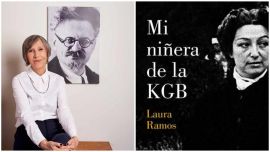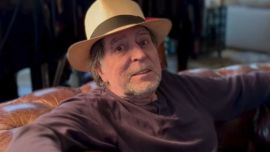Argentina’s political class and business leaders descended on the Alvear Icon Hotel in Puerto Madero on Tuesday for the annual AmCham Summit, with all eyes on the potential future occupants of the Casa Rosada in attendance.
The event, which also celebrated 200 years of bilateral relations between the United States and Argentina, got off to a spicy start with AmCham President Facundo Gómez Minujín mourning the “recession with inflation” that faces the nation in the near future.
Decrying the fact that some 39 percent of the population lives in poverty and that the country was on the “border of a new crisis,” Minujín, senior country director for JP Morgan, offered criticism of President Alberto Fernández’s government by saying that it is “impossible” for business to “plan in the long term without a plan in the short term.”
A similar tone was adopted by Supreme Court Chief Justice Horacio Rosatti, who complained about the workload facing the Supreme Court and criticised the government's attempts to reform Argentina’s Judiciary without “inter-power dialogue.” The nation’s highest tribunal, he argued, was swamped by the sheer amount of cases that reached its docket. He went on to accuse state bodies of appealing rulings they knew they would lose to the Supreme Court in order to “win time,” rather than face the consequences of rulings by lower courts.
Rosatti, who issued a strident defence of capitalism and its constitutional backing, then went on to make eyebrow-raising comments about economic policy, strongly criticising money-printing policies which he said exacerbated inflation.
“The value of the currency is not being defended,” he complained, accusing the government of “betraying the national constitution.”
Those remarks sparked a furious reaction from President Alberto Fernández, who said Wednesday that Rosatti had “no authority, no powers, no knowledge to give an opinion on the direction of the government's economic policy.”
“The fact that the president of the court thinks he can give an opinion on what the government should do with the economy is a sign of a very important lack of separation of powers,” he declared.
Negativity did not, however, dominate the event. Keynote speeches from US Ambassador to Argentina Marc Stanley and Argentina’s envoy in Washington, Jorge Argüello talked up the opportunities for growth between the two nations.
Stanley highlighted Argentina’s resources, declaring that his host nation could be “part of the solution” to the problems facing the global economy.
"Despite the challenges Argentina faces, I am optimistic because Argentina has excellent resources in the field of oil and gas, minerals and the most important asset, human capital", he reflected, describing his position as “bullish.”
For his part, Argüello hailed bilateral relations, which he said had reached “a peak” during President Fernández’s recent meeting with US President Joe Biden at the White House.
“In two years, we have taken practically the whole cabinet” to Washington, he remarked, underlining the “enormous spirit of collaboration that Argentina is finding in the US government.”
Presidential hopefuls
The most intriguing section of Tuesday’s event – and the parts that drew the most attention from those gathered – was the revolving carousel of presidential hopefuls who pitched their plans to the audience.
Veteran Peronist Daniel Scioli was the first presidential hopeful to appear onstage and the first to deliver some notable talking points. Pitching his campaign as federal and slamming the “pessimism” that is dominating the country, Argentina’s ambassador to Brazil revealed that, should he win the nomination for Frente de Todos, his running-mate would “come from the interior” as he promised to draw up a formula for governing, not just to win the election.
Like many of the hopefuls, he refused to make promises and give clear details about exchange rate policy, but he was willing to say that the ruling coalition should stage a competitive PASO primary, declaring: “I don’t want to be chosen behind closed doors.”
Opposition presidential hopeful Patricia Bullrich was the next to make her case, portraying herself as a person of “conviction” and strength. Vowing to remove laws that are “contrary to production,” she said Argentina’s current economic crisis meant it was the “exact moment for someone like me.”
She told business leaders that the “cepo” clamp on foreign currency is “paralysing the economy” and that Argentina’s worker-friendly redundancy laws should be reformed to remove the “sword of Damocles hanging over companies.”
Pushed by questioner Alejandro Fantino on the potential problems should she lose the PASO primary to her coalition rival, Buenos Aires City Mayor Horacio Rodríguez Larreta, Bullrich said “whoever wins must be very generous” and said the opposition would remain united, come what may.
Taking to the stage barely an hour after her interview, Rodríguez Larreta himself echoed that line but offered real confidence about his candidacy, declaring that when he wins the Casa Rosada the country will have an economist leading the nation.
Admitting that the first two years of the next administration’s term in office will be difficult, he said there is no “magic solution” to Argentina’s problems and underlined the importance of constructing a “political majority” to introduce real change to the nation. "People want a change, we're getting ready to govern,” he told those gathered.
Not everyone, however, is seeking a change at the top of government. Economy Minister Sergio Massa’s AmCham appearance was one of the most highly anticipated, business leaders told the Times.
Massa, who has not declared an intention to run for the presidency, is regarded by most analysts as perhaps the only candidate who could retain the Casa Rosada for Frente de Todos and while the initial questions he faced addressed the ongoing negotiations with the International Monetary Fund, exchange rate turmoil and Central Bank reserves, the returning Gómez Minujín eventually asked the minister the question on everyone’s lips: “Are you going to be a candidate?”
Answering with a laugh and a smile, Massa repeated an answer he has previously deployed, saying that any such decision would be made with his family and highlighting that his children are now adolescents and therefore a bigger factor for him.
Notably, however, he did offer a shard of light to those who wish he would run, saying that the government should not “generate uncertainty for the people” and that any candidacy would have to have “internal agreement.”
The minister, of course, had no intention of declaring his intentions with any clarity, but he did utter one phrase which may hint at his preference: “I am part of a coalition government and I want my government to keep governing.”




















Comments